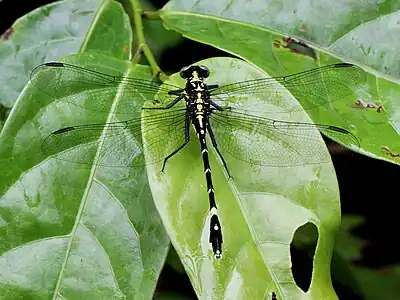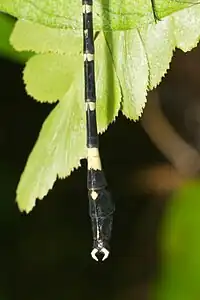| Merogomphus tamaracherriensis | |
|---|---|
 | |
| Male | |
| Scientific classification | |
| Domain: | Eukaryota |
| Kingdom: | Animalia |
| Phylum: | Arthropoda |
| Class: | Insecta |
| Order: | Odonata |
| Infraorder: | Anisoptera |
| Family: | Gomphidae |
| Genus: | Merogomphus |
| Species: | M. tamaracherriensis |
| Binomial name | |
| Merogomphus tamaracherriensis Fraser, 1931 | |
| Synonyms | |
|
Merogomphus longistigma tamaracherriensis Fraser, 1931 | |
Merogomphus tamaracherriensis[1] is a species of large dragonfly in the family Gomphidae. It is endemic to the forest streams of Western Ghats of India.[2][3][4][5]
Description and habitat
It is a large dragonfly with bottle-green eyes. Its thorax is black, marked with bright yellow. Sides are greenish-yellow traversed by two closely parallel black stripes. Abdomen is black, marked with bright yellow.[4][5]
Fraser described this dragonfly as a race or subspecies of Merogomphus longistigma in 1931. He differentiated it from M. longistigma longistigma by the colour of the occiput and abdominal markings, as well as by its smaller size. The occiput entirely black here whereas greenish yellow in M. longistigrna longistigma. The mid-dorsal spot on segment 3 is isolated, and entirely absent on segments 4 to 6. There is a narrow mid-dorsal stripe in segment 3 to 6 in M. longistigrna longistigma.[4][5]
There is a mid-dorsal tiny diamond-shaped spot on the base of Segment 8. Segments 9 and 10 usually unmarked; but sometimes marked with a fine mid-dorsal streak on 9 and a tiny mid-dorsal apical point of yellow on 10.[5]
As advised by D. E. Kimmins, Fraser revised this species in 1953. He figured out that the anal appendages differ rather widely from those of M. longistigma. The anal appendages of M. longistigma are decidedly depressed for the distal half and the apices turn sharply upwards. In M. tamaracherriensis, the base slopes sharply away on the inner side so that the fenestra is diamond-shaped.[1]
 Male
Male Female
Female Anal appendages (male)
Anal appendages (male)
It is commonly found in marshlands, bogs or streams at the foot of hills.[5]
See also
References
- 1 2 Fraser, F. C. (1953). "Notes On The Family Gomphidae With Descriptions Of A New Species And The Female Of Another (Order Odonata)". Proceedings of the Royal Entomological Society of London. Series B, Taxonomy. 22 (11–12): 191–192. doi:10.1111/j.1365-3113.1953.tb00043.x.
- ↑ "Merogomphus tamaracherriensis Fraser, 1931". Odonata of India, v. 1.00. Indian Foundation for Butterflies. Retrieved 2017-02-11.
- ↑ K.A., Subramanian; K.G., Emiliyamma; R., Babu; C., Radhakrishnan; S.S., Talmale (2018). Atlas of Odonata (Insecta) of the Western Ghats, India. Zoological Survey of India. p. 237. ISBN 9788181714954.
- 1 2 3 C FC Lt. Fraser (1934). The Fauna of British India, including Ceylon and Burma, Odonata Vol. II. Red Lion Court, Fleet Street, London: Taylor and Francis. pp. 313.
- 1 2 3 4 5 C FC Lt. Fraser (1931). Additions to the Survey of the Odonate (Dragonfly) Fauna of Western India, with Descriptions of Nine New Species (PDF). p. 460.